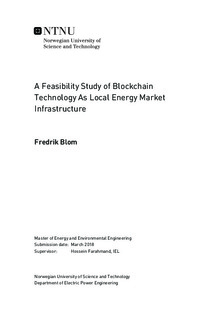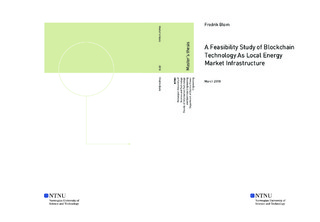| dc.description.abstract | The recent surge in renewable energy in the distribution grid could transform the generation side to be more variable, which potentially reduces power quality. This technical local challenge could be compensated by introducing a market solution, which could be realised in the form of a local energy market. Such markets requires a comprehensive infrastructure, where a centralised database solution traditionally have been used. However, blockchain technology have lately been presented as a possible preferable alternative. Blockchain is a decentralised communication platform, which logs all information in a structured and tamper-proof manner. This design makes it potentially suitable for operating a local energy market. However, there have not been performed a lot of research on the feasibility of developing local energy markets using blockchain technology. This will be therefore be the focus of this thesis, where a technical, economic and regulatory analysis are performed.
This thesis address this feasibility by developing a complex local energy market, deploying this on a test blockchain and analyse the results. The market consists of three unique trading mechanisms, where all explores the benefits of flexible loads. These trading mechanisms are then represented as blockchain applications, and simulated over a range of scenarios. The results illustrate a proof of concept, in addition to measure the usage of computational resources of operating blockchain applications.
The market simulation proved the technical feasibility of running several complex mechanisms in a blockchain environment, with an integrated payment solution. The observed computational resource consumption of the market revealed that a complex real time trading with 600 nodes and a trading frequency of 5 minutes requires a blockchain that can process 10.2 standard Ethereum transactions per second. This is considered to be possible for a modern blockchain protocol to process. The blockchain application design is also analysed, where it is identified how applications should be designed in order to lower the resulting computational consumption. In result, this thesis identifies blockchain technology as suited to operate a local energy market, without significant negative computational consequences.
Regarding the economical feasibility, such a solution is considered to be more expensive than a database solution when it comes to development costs. However, a blockchain solution presents new market possibilities, which could result in a more efficient market, and hence be more economically beneficial. Regarding a regulatory analysis, the Norwegian energy market regulations presents several challenges towards decentralised local energy markets. However, the technology behind blockchain could provide arguments for changing these regulations, and hence make it possible for end users to participate actively in an energy market. | |

